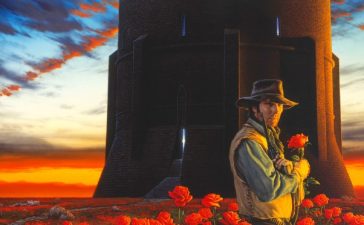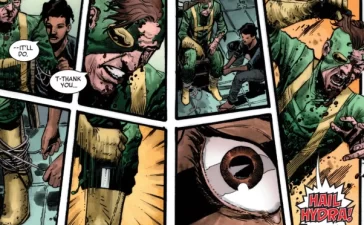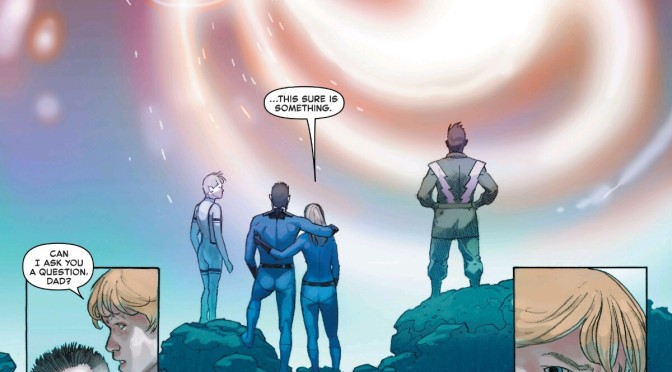
Comic Convo: Secret Wars #9
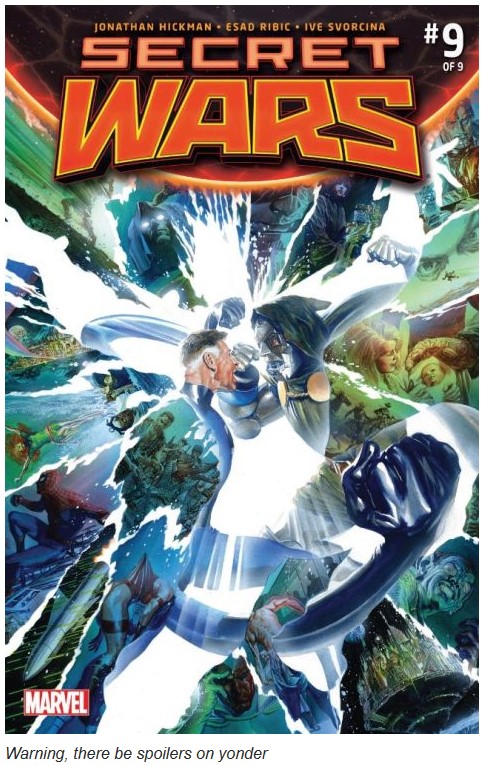
Cosmo: Last week Marvel brought its latest mega event to a close. However, unlike many past iterations, Secret Wars proved to be a fantastic series. One of the reasons is that it did not follow any predictable flow which held true until the end. I could not have predicted most of the story beats that we got in the finale. Yes, I figured that Reed would defeat Victor but the how and what came next was a surprise . . .
Pat: What a fantastic series & a wonderful closing for story. I loved the way it showed Reed & Victors final conflict and how it closes out the story for both characters
Cosmo: The abstract nature of Reed and Doom’s struggle was nicely done. First the mosaic blending of their faces then the image of Doom wrapped up in Reeds limbs. Once again we need to state just how amazing Esad Ribic was on this series. All the frustrating delays were well worth it to keep him as the sole illustrator.
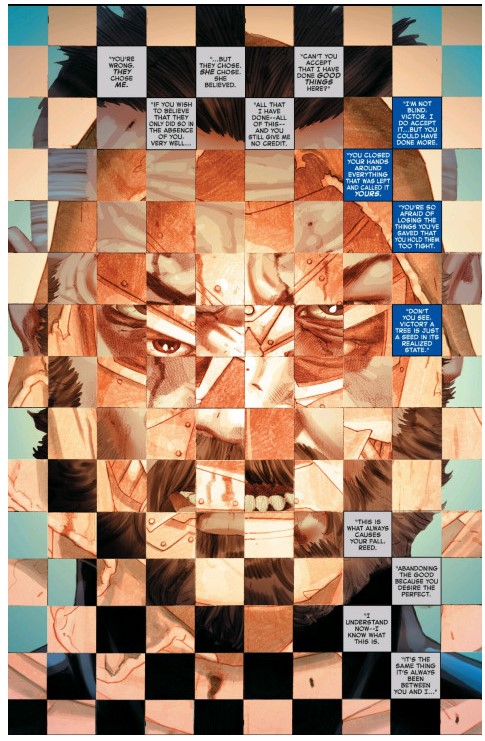
I really liked where Hickman placed the Richards family at the end. Many have pointed out already the appropriateness of Marvel’s First Family literately recreating the Marvel Universe, but for me it held an even more direct link to the past. What really makes those early Stan Lee/Jack Kirby Fantastic Four stories stand out was their use of the unworldly. Negative Zone, Galactus, the Inhumans, this was the material that really made those issues zing. So, Hickman relocating them to such a cosmic setting was perfect. It was also a great way to incorporate the Future Foundation and make good on the promise of their name. The Future Foundation has long been my favorite element of Hickman’s Fantastic Four run, so it was a pleasure to see them there at the end as well.
Pat: It was such a cool ending for the FF as a whole. It was a fitting for the metaphor of Secret Wars and its use of The Fantastic Four mytho’s. Like you, I love putting the Fantastic Four back in a cosmic space
Cosmo: And it gave a good setting for Reed to reaffirm himself as a husband and father. So much of Hickman’s run, like many others have, centered on the idea of Reed as the brilliant scientist, distracted from his family life. In the end Hickman gave a way for Reed to still be a hero (I loved that bit about “are we still superheroes”) and a father/husband. It was a great piece of work which really clicked and earned the poignancy of the Richards clan together again.
Of course, I could go on to point out that he has also chosen to let his best friend and brother-in-law believe him dead, which leaves a bit of a rupture in the whole united family picture. But I think that the concept of Reed and Sue just needing time for themselves and their kids (natural and adoptive) is legitimate. Ben and Johnny can handle themselves. Besides we all know they’ll be reunited sooner or later.
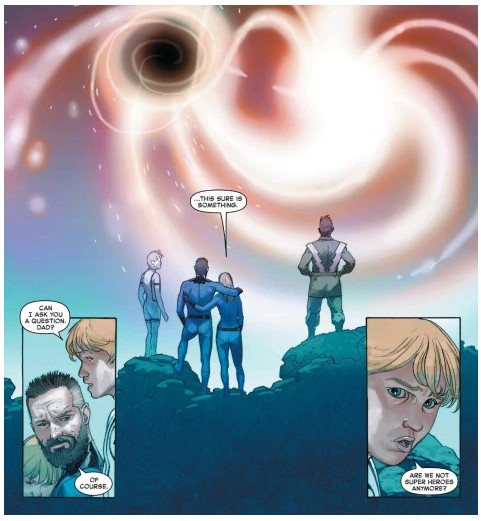 Pat: Yeah but, that’s also the really interesting thing to me about the ending in that, it harkens back to Hickman’s FF run which ended up being about the importance of family as well. Hickman was a writer that’s been on a bit of a nihilist streak since then, but I’m glad it circled back to a more wide angle view. It was a nice touch to end it on “Everything lives” with the whole family working together to create life across the multiverse
Pat: Yeah but, that’s also the really interesting thing to me about the ending in that, it harkens back to Hickman’s FF run which ended up being about the importance of family as well. Hickman was a writer that’s been on a bit of a nihilist streak since then, but I’m glad it circled back to a more wide angle view. It was a nice touch to end it on “Everything lives” with the whole family working together to create life across the multiverse
Cosmo: Yes, Reed’s speech about changing his worldview culminating in “Everything Lives” was nicely done. It was quite refreshing after the months and months of dour, stubbly Reed in New Avengers.
You mention Hickman’s prevailing sense of pessimism and that was a topic I wanted to discuss. Ever since #1, Secret Wars has reminded me strongly of his Image series East of West. The impending threat of Armageddon is one of the core themes of that series, while Secret Wars started off with the just that: the annihilation of all existence. Then, in #2 readers discovered a little bit survived rather precariously. So precariously that after a few chapter it looked like what was left would be torn apart as well. The two series really shared that sense of violent worlds where civilization barely held itself together. (That they were both illustrated by artists of fantastic imagination strengthened that impression).
Of course, in the case of Secret Wars, readers knew that Hickman could not permanently destroy the Marvel Universe, that something all-new an’ different would rise from its ashes. However, the ending we got felt very organic, not at all editorial mandated. So, do you think that this offers a peak into Hickman’s thinking? East of West is creator-owned — it could conclude with a desolate void if Hickman wished. (We know how much he loves empty space). Issues like Secret Wars #9 suggest that there might be hope for the other series after all.
Pat: That’s an interesting question and one that I think maybe points to a clear difference between Marvel & Image series by the same creators. That being, while the work from creators at Image & Marvel often share similar sensibilities, the Marvel comics almost always have a happy ending on some level. I’ve actually been thinking about that a lot in terms of Kelly Sue DeConnick and how while her Marvel work feels very similar all the way through in tone and style, her comics at Image are radically different from one another. While I wouldn’t classify that as “editorial interference” on the part of Marvel, I do think that it’s expected for their to be a happy ending at the stories conclusion somehow. This can mean a lot of different things, one of my favorite closing chapters of a run from this collective of creators that Marvel and Image essentially shared was Remender’s final issue of Venom which was about coming to terms with trauma from your own life and accepting that it’s always going to be a part of you but doesn’t necessarily define you. Kelly Sue DeConnick did something similar in her last issue of Captain Marvel which was a retrospective of coming to terms with a terminal disease. I have a hard time seeing East of West or Manhattan Projects get a happy ending, I could be wrong but the way those series have gone so far, that doesn’t seem like either of those books styles. Hickman probably stretched the possibility of the non happy ending in his Avengers comics, which if you take as something separate from Secret Wars, were definitely not a happy ending at all. In fact, the two series close on the statement that “everything dies” From what I’ve been led to understand, Secret Wars was always the intended ending for his run on the Avengers comics and it was retroactively made into an event later on. So while I think there was thematic similarities between this & East of West, the book was always going one way towards it’s conclusion. With that being said, the ending Hickman does here with the Fantastic Four is really beautiful & poignant with something really special about the series as a whole leading to that moment.
Cosmo: Well a “happy ending” for East of West is not necessarily what I mean. Perhaps more bittersweet than depressing want to kill yourself.
Where would you put Kieron Gillen in that theory? Young Avengers was mostly positive at the end, expect the final beat belongs to Loki’s wistful sense of loss. Gillen’s final Marvel Universe project Siege definitely did not conclude on an upbeat note.
Pat: I’d say Young Avengers definitely ends on the upswing, with the Loki thing being “bittersweet” Siege, and Secret Wars tie in’s as a whole were a very different thing altogether which is another reason why this event was so great
Cosmo: True, Gillen could kill off whoever he wanted in Siege (short of Ben “The Wall” Grimm) knowing that it wouldn’t have larger story consequences.
One aspect of #9 we have not addressed yet is the deity at its center: Victor Von Doom. I really enjoyed Hickman’s portrayal of Doom throughout the series, layering in little bits of humanity, especially in his interactions with Susan. The reader felt the weight of reality on his shoulders. At the same time he remained the same smug tyrant readers love.
That said, I am conflicted about his role in the #9. I understand thematically why Hickman has Doom admit his inferiority to Reed; it’s a great trap. However, I am not sure if Doom possesses the same self-destructive, inferiority complex that plagues a character like Thanos. It seemed like a little too easy of an out for Hickman . . .
Pat: I disagree. For me, that moment felt very real & human. At that point, each character is at their wits end & there’s no more bullshit between the two. In that, it’s more a moment of brutal honesty between two men that have opposed one another for their entire adult life.
Also, Doom makes the implication that Reed couldn’t make the decisions he made. Yes he would make a better world but he doesn’t have the gumption Doom has to make those hard decisions
Cosmo: I do see where you’re coming from that they have both been pushed to their limits and are simply exhausted. The scene did very much capture this visceral sense of near collapse. Again the art really drove home the point with Ribic’s sparse backgrounds and Svorcina’s bleached out colors. It was almost as if they wrestling within a sun, which I suppose in a sense they were.
This does get to the heart of my one sticking point about the issue: when I read it for the first time I loved the ending. The fact that Reed has healed Victor’s face is a perfect summery of what we discussing earlier about his shift in perspective. Reed feels hope once again. And by physically healing Victor, he hopes that he can nudge Victor into being a better man, living to his full potential. And Victor’s silent laughter was a really great reaction. Victor’s smart, he gets what’s happened. But will it stick? I’d say time will tell, but recent events over in Squirrel Girl suggest not really . . .
Then, the more I thought about it, I was like “wait, what about Ben?” Classically speaking at least, is not Reed’s inability to “fix” his friend considered his biggest failing, the one inability that haunts him the most? If Reed were truly in a position to “solve everything”, wouldn’t that be at the top of the list?
So, I loved the Victor beats in the context of Secret Wars, but was a little less sure of their place in the larger history of the characters.
Pat: Well in regards to Ben, the Future Foundation actually figured that out for him in Hickman’s Fantastic Four run. With post Secret Wars Doom, I think the one in Squirrel Girl is actually from the 1960’s. The one they show in Iron Man is somewhat closer the characters limited portrayal at the conclusion of Secret Wars #9.
On the War Rocket Ajax podcast, when Chris Sims & Matt Wilson were talking about the early Fantastic Four comics, they note that Doom basically debut’s fully formed and for the most part I agree. That said, I do think that Hickman has subtlety added layers to Doom’s personality. What’s smart about it was that it’s not in your face, it feel’s very natural. Because of that, I think the moments with Doom at the series conclusion were earned in a really cool way.
Cosmo: That’s right, I forgot about that subplot involving Ben and the Future Foundation. It was a formula that made him normal for 24 hours once a year or something like that?
I do agree with you about the subtle layering of Doom’s personality. Hickman really found a great way of rendering him more complex without having to take away any of his “evilness” (as opposed to what writers have tried to do with Magneto over the years). And you’re right about the final moment being earned. I can hear Victor laughing to himself as he thinks “fine Reed, you’ve proved your point. This round goes to you, but next time . . .”
I haven’t been reading Bendis’ Iron Man. In what way has he or hasn’t he been drawing on the Doom’s experience at the end of Secret Wars?
Pat: He no longer wears the mask or really anything of the traditional Doom garb. He’s still a cocky asshole, but less crotchety. To be perfectly honest, I’m not sure if it totally works for me but that’s something I would put more on Bendis and how he tends to lighten up a lot of character’s as opposed to Hickman’s direction in this series. If were talking Dr Doom in Secret Wars, not only do I feel that the moment where Doom admit’s to Reed that he would have done better fit’s within the historical context of that character through what we’ve seen in the series previous chapter’s, but moreover I think it’s a unique insight into Doom & Reed’s dichotomy that add’s more meaning to the entire series as a whole when you consider how Doom basically take’s Reed’s place in the family.
Cosmo: Yeah that sounds like a fair bit of Bendisisms going on there.
Doom substituting himself for Reed as head of the Richards family was a great subtle nod to how Victor’s unconscious functioned.
We’ve spent most of our discussion examining Hickman’s treatment of Reed and Doom which is fair as they were at the center of the story-line. Were there any of other characters or corners of the Marvel Universe that you felt Hickman did a particularly good job highlighting? Personally, I loved how he wrote Mr. Sinister as this complete self-absorbed ne’er do well. Gillen already wrote him as a type of dandy but one with a gentleman’s tone. In Hickman’s hands he sounded like that arrogant guy talking too loudly next to you at the bar. Not really sure how it connects to the original 90s version, but, damn it was a lot of fun to read, especially after he kept on gabbing even after his decapitation . . .
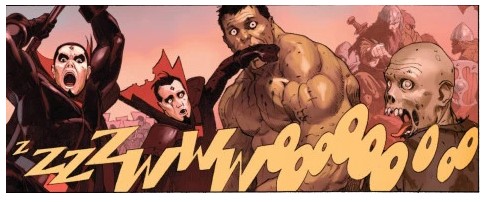
Pat: Mr Sinister was fantastic. Hickman’s writing of Valerie continued to be character defining. While Christopher Priest is probably my favorite Black Panther writer, Hickman is a close second with his quiet yet inettlectually brilliant bad assery. Ultimate Reed Richards is always interesting, he captures Namors dickheadness at it’s essence and Hickman always does a good Thanos. In a lot of ways, Hickman is great at writing layers of personality to dudes that are ultimately pricks.
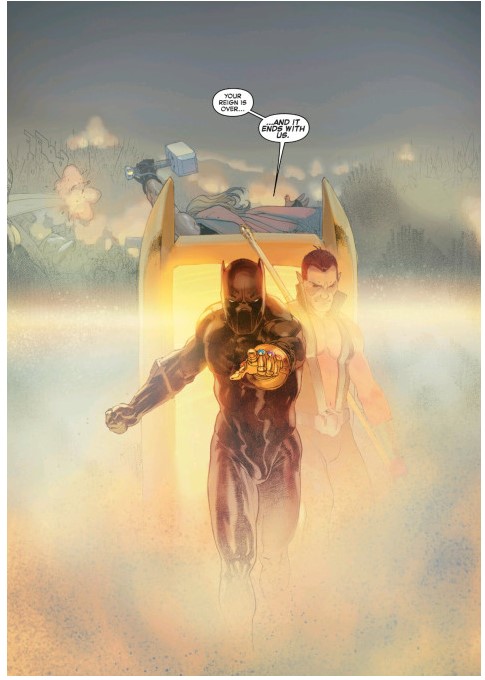
Cosmo: Yeah, Hickman does write the best Valerie. His Franklin is pretty great as well. I still remember reading Hickman’s Dark Reign Fantastic Four mini and thinking “whoever this Hickman guy is, he sure writes a super Val and Franklin.” Which is kinda ironic given that I agree with your statement about how well Hickman handles conceited egos. (Plenty of examples of that in Manhattan Projects and East of West as well). His Namor has always been great. It was weird reading the opening of #9. I was thinking “this is a great spotlight for Namor, I wonder what’s next for–oh yeah, right . . .” The best ego moment for any character might have been Maximus’ rousing pep speech to his soldiers, followed by his swift unceremonious death . . .
As you know, I did not care for Thanos in Infinity, but thought that Hickman had a much better handle on him in Secret Wars.
Thinking about all this makes me wonder what a Hickman scripted Adam Warlock book would be like . . .
Pat: That’s the one that readers have been waiting for.
Getting to the Namor part, did knowing what happened after Secret Wars negate any of it for you?
Cosmo: Not really. As I said above, the fact that the Marvel Universe survived was not really a spoiler, as no one expected Marvel to immediately cease publishing anything except Star Wars and Deadpool (he’d survive somehow, you know he would). So the ending was never a matter of will, as much as how. Only thing I would have done differently was hold off on Doom coming back right away — it did take away from the suspense of #9 knowing Doom would still be around.
I think the main downside of Secret Wars overlapping with the All-New All-Different relaunch is that I am a little confused about what is remembered about the incursions. In Ms. Marvel G. Willow Wilson writes as if the average person on the street remembers the world almost ending, and all the events of Last Days are still vivid in memory. Other books seem to have simply picked up as if nothing happened. But that’s a minor concern and if that was the trade-off for 9 issues full of Ribic’s art, well, then it was well worth it.
What I do find interesting is that after all the fan concern about a Marvel reboot that didn’t really happen. Except for one or two things (Miles’ mom coming back to life) there really was very little change of the status-quo. Or at least the kind of change that requires a reboot . . .
Pat: People always claim Marvel will do a reboot and it never happens. I think part of what their marketing does is play that up and then never follow through. That’s like with the Fantastic Four, once there were rumors about the book ending because of the movie, they played that up hard but at the same time, the Fantastic Four was the center piece of Secret Wars which is probably their biggest event in years and while there was no Fantastic Four comic during the movie’s release, there was no Avengers or Captain America either as that was a byproduct of the event itself.
As for knowing what would happen to Doom, I was actually worried that his appearance in the Iron Man book would take the sting out it, especially since he shows up without his mask. But what Hickman & Ribic did was so good that it was a nonissue for me.
Cosmo: Yeah, Marvel’s marketing department does know how to get fans’ attention. Wasn’t one of the original teases about Secret Wars that the Marvel multiverse would go away? Well, that clearly did not happen in the end . . .
I do think that all the Fantastic Four rumors are interesting in the light of Secret Wars’ ending. Taking Hickman at his word, the resolution of the story never changed during its long evolution. That means he first came up with the idea of Reed remaking reality four or five years ago. So all those “clues” such as Marvel breaking up the team and canceling the title were really pointing towards the ending of Secret Wars not some anti-Fox agenda.
Pat: I do find that strange on some level. On the one hand, Hickman clearly loves the Fantastic Four and him using Reed from the start would seem that this always felt like his intent. On the other hand, why would you conclude your Avenger’s story with the Fantastic Four?
Cosmo: Well, I think that you provided your own answer: Hickman loves Reed Richards. Also, remember, Reed was folded into the New Avengers title from the start through his membership in the Illuminati. Bendis had been so successful establishing this connection in the past, no one really thought twice about Reed appearing regularly in an Avengers title.
On the other hand, maybe this was one of the catalysts for the event growing beyond the scope of a mere Avengers project?
Pat: That makes sense. So how do you feel about the final issue, it’s context in the series & Secret Wars overall now that we’ve read the entire story?
Cosmo:The concluding issue was a strong finale for what has been an exceptional Event. All the plot points and character beats fit together in a way that flowed naturally from the previous issues. Event fatigue is so prevalent these days that it was understandable when the announcement of Secret Wars was greeted with skepticism from many fans (myself included). However, we were proven quite wrong. Hickman felt personally invested in this project (unlike say Jason Aaron and Original Sin); these characters and events meant something to him. That type of creator engagement always shows and goes a long way to crafting something meaningful.
I think that one of the strongest legacies of this series is the lesson it provides in creative freedom. Again and again in our coverage of the event we have stressed how thrilling it is to see creators let their imaginations run wild. This is equally true for Hickman and Ribic in the main book and the various talents who created the tie-ins. Together they really raised the bar for what an event can be.
Finally, Secret Wars explored a wide variety of genres. I hope that the Big Two study the popularity of these (i.e. Secret Wars, Secret Love) and recommit themselves to pumping out something beyond action focused superhero adventures.
Pat: Not only was our or the general critical reaction almost uniformally positive for Secret Wars, but perhaps more importantly for Marvel, the book itself, along with many of it’s tie ins, were a huge sales success. Sure event comics always sell well, but how many of them sell this well for this long in spite of natural obstacles like delays or just general attrition of the audience. Secret Wars maintained it’s sales consistency despite having to compete with some pretty big comics from Marvel’s competitors (Batman, DKIII, Walking Dead #150) in addition to the publisher itself with several big Star Wars releases like The Force Awakens Prequels or Vader Down along with the All New, All Different relaunch. That should show that comics consumer will come for the first issue of an event because it’s an event, but they’ll stay around for the quality. In and of itself, Secret Wars as a nine issue comics series was unequivocally excellent and the reaction of readers to the book reflected that. I don’t have high hopes for Civil War II but what I do hope is that Marvel & DC Comics will learn from this and act accordingly Event’s are just a reality of corporate comics at this point but if anything, Secret Wars show’s that just because they exist to appeal across a wide spectrum of readers, doesn’t mean they have to be disposable, less creative or dumbed down to be successful. In reality, what Secret Wars showed was the opposite. An event comic can be complicated and unique, it can be high concept and radical in it’s vision but when the quality of the material is of the highest order, it can not only be successful, it might be more successful then it’s predecessors. Granted, it’s not everyday that you get a a writer and artist combination as strong as Hickman & Ribic but they aren’t the only guys doing this. Why not have Snyder do an event comic with Jim Lee or Ivan Reis at DC? Why not let Jason Aaron do something that’s singularly Jason Aaron with Stuart Immonem for the next Marvel event? What I want is, that Secret Wars can set a precedent for future event books where the emphasis on quality and creativity is viewed as an important factor in terms of the book’s success.
Cosmo: Agreed. And I think the other key component in all this is let the event flow naturally out of what the creator is already doing. One of the reoccurring complaints about events is how artificial they are. Secret Wars meant something to Hickman because he already had years invested in the storytelling. So, say, you want Jason Aaron telling a distinctly Jason Aaron epic — let him seed it in his titles and organically grow it into something larger. Back in the 90s, Jim Starlin spent about a year laying the groundwork for Infinity Gauntlet, moving the pieces into place. It makes a difference.
Pat: I think that maybe having the event happen naturally is one of the most important part’s of the book’s success. Hickman has said that Secret Wars was only meant to be the conclusion of his time on Avengers/New Avengers, but Marvel saw the potential in that and made it an event book. Maybe instead of trying to manufacture these stories out of need, why not try and recognize the potential for these books in the upcoming plotlines and go that way. Speaking of Aaron, clearly his Dr Strange is laying the groundwork for a big epic about magic in the Marvel U down the line and it feel’s like Robinson’s Scarlet Witch is going in a similar direction. Whatever that conclusion may be that the two writers have intended, those stories have the potential to be a great event comic and you already have the talent right there to make it work. I think we know that event comics will generally sell well no matter what so why not make them great enough that they can sell even more in terms of reprints and trade collections?
Cosmo: Someone asked Bervoort on tumblr about that other day, pointing out that Dr Strange, Scarlet Witch & Hercules all seem to experiencing similar overlapping problems with magic and asked was this leading somewhere. Bervoort skipped his generic “wait and see” and implied that there was something in the works.
I think that some sort of crossover related to those books has a lot of potential; there’s a trio of strong writers involved already. Also, if they let it simmer for a few months there’s plenty of time to build the story before a certain Sorcerer Supreme’s Silver Screen debut later this year.
So, yes, letting something develop organically would go a long way to countering fans’ more cynical reactions to things like Civil War 2.
Pat: I can’t even with Civil War 2. Apparently a character is supposed to “die” that they were making a big deal about. Like who gives a fuck, especially after Secret Wars where we saw how many character’s “die” only to be featured in books taking place in future continuity that were coming out at the same time as Secret Wars.
Cosmo: See, this is again where approach makes all the difference. Marvel announced they were doing a sequel to Civil War just when the film version of the original is being released? Then they try to hype it with “a major character WILL die.” It simply sounds crass. Now in theory, there is no reason why a Civil War sequel, handled properly, could not be intriguing. After all there are plenty of divisive issues in society today that could provide fodder for the conflict. Yet, there’s nothing about Marvel’s marketing that suggests it is more than a craven cash grab. Could I be proven wrong? Of course, but my expectations are pretty low . . .
Pat: Well, let’s hope that Marvel learns from Secret Wars success for future events. If nothing else, will always have this series which I plan on going back and reading again as soon as possible.
Cosmo: Yeah, this one’s going on my “rebuy in hardcover someday” list . . .







